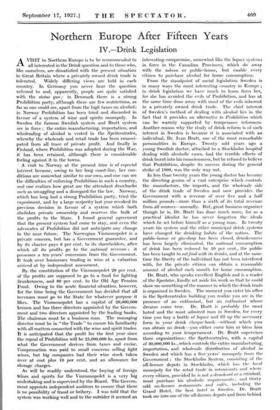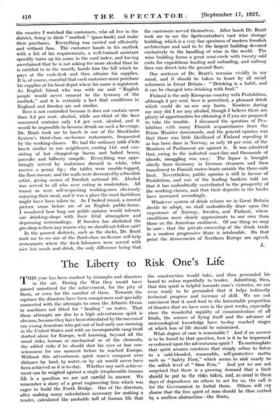A VISIT to Northern Europe is to be recommended to all
interested in the Drink question and to those who, like ourselves, are dissatisfied with the present situation in Great Britain where a privately owned drink trade is tolerated. Widely differing views are held in each Country. In Germany you never hear the question referred to and, apparently, people are quite satisfied with the status quo ; in Denmark there is a strong Prohibition party, although there are few restrictions, as far as one could see, apart from the high taxes on alcohol; in Norway Prohibition has been tried and discarded in favour of a system of wine and spirits monopoly. In Sweden the famous Swedish system and Bratt system are in force ; the entire manufacturing, importation, and wholesaling of alcohol is vested in the Spritcentralen, whereby the wholesale and retail trade has been emanci- pated from all trace of private profit. And finally in Finland, where Prohibition was adopted during the War, it has been retained, although there is considerable feeling against it in the towns.
- A visit to Norway at the present time is of especial interest because, owing to her long coast-line, her con- ditions are somewhat similar to our own, and one can see the difficulties of enforcing Prohibition in such a country, and one realizes how great are the attendant drawbacks such as smuggling and a disregard for the law. Norway, which has long had a strong Prohibition party, tried the experiment, and by a large majority last year revoked its previous decision in favour of a system which both abolishes private ownership and reserves the bulk of the profits to the State. I found general agreement that the present system had come to stay, and even the advocates of Prohibition did not anticipate any change in the near future. The Norwegian Vinmonopolet is a private concern, but has a Government guarantee, and by its charter pays 6 per cent. to its shareholders, after which all its profits go to the national revenue ; it possesses a ten years' concession from the Government. It took over businesses trading in wine at a valuation arrived at by independent assessment.
By the constitution of the Vinmonopolet 20 per cent. of the profits are supposed to go to a fund for fighting drunkenness, and 80 per cent. to the Old Age Pension Fund. Owing to the acute financial situation, however, for the time being the Government has decided that all revenues must go to the State for whatever purpose it likes. The Vinmonopolet has a capital of 20,000,000 krOnen and has three directors appointed by the Govern- xnent and two directors appointed by the leading banks. The chairman must be a business man. The managing director must be in "the Trade" to ensure his familiarity with all matters connected with the wine and spirit trades. it is anticipated that the profit for the first year since the repeal of Prohibition will be 25,000,000 ks. apart from what the Government derives from taxes and excise. Compensation was paid to small concerns selling light wines, but big companies had their wine stock taken Over at cost plus 10 per cent, and an allowance for storage charges.
As will be readily understood, the buying of foreign Wines and spirits for the Vinmonopolet is a 'very big undertaking and is supervised by the Board. The Govern- ment appoints independent auditors to ensure that there is no possibility of fraud or bribery. I was told that the system was working'well and to the outsider it seemed an interesting compromise, somewhat like the liquor systems in force in the Canadian Provinces, which do away with the saloon or public-house, but enable every citizen to purchase alcohol for home consumption.
From the standpoint of social legislation Sweden is in many ways the most. interesting country in Europe ; in drink legislation we have much to learn from her, for she has avoided the evils of Prohibition, and has at the same time done away with most of the evils inherent in a privately owned drink trade. The chief interest of Sweden's method of dealing with alcohol lies in the fact that it provides an alternative to Prohibition which can be warmly supported by temperance reformers. Another reason why the study. of drink reform is of such interest in Sweden is because it is associated with an individual, Dr. .Ivan Bratt, one of the most remarkable personalities in Europe. Twenty . odd years ago a young Swedish doctor, attached to a Stockholm hospital dealing with alcoholic cases, had the terrible effects of drink burnt into his consciousness, but he refused to believe that Prohibition, despite its success during the general strike of 1909, was the only way out.
In less than twenty years the young doctor has become the directing genius _ of a vast enterprise which controls the manufacture, the imports, and the wholesale side of the drink trade of Sweden and now provides the Government with a revenue of over five and a half million pounds—more than a sixth of its total revenue from all sources—annually. But, great business organizer though he is, Dr. Bratt has done much more, for as a practical idealist he has never forgotten the ideals which he set before himself as a young man. In twenty years his system and the other municipal drink systems have changed the drinking habits of the nation. The public-house or gin-shop has been closed, drunkenness has been largely eliminated, the national consumption of drink has been reduced by 50 per. cent., the public has been taught to eat food with its drinks, and at the same time the liberty of the individual has not been interfered with, for the private citizen can obtain a reasonable amount of alcohol each month for home consumption.
Dr. Watt, who speaks excellent English and is a reader of the Spectator, kindly set aside his work so that he could show me something of the manner in which the drink trade is organized in Sweden. The moment you enter his office in the Spritcentralen building you realize you are in the presence of an enthusiast, but an enthusiast whose dreams come true. Dr. Bran is probably the most hated and the most admired man in Sweden, -for every time you buy a bottle of liquor and fill up the necessary form in your drink cheque-book—without which yOu can obtain no drink—you either curse him or bless him according to your temperament. Dr. Bratt supervises three organizations : the .Spritcentralen, with a capital of 30,000,000 ks., which controls the entire manufacturing, importation, and wholesale distribution of alcohol in Sweden and which has a five years' monopoly from the Government ; the Stockholm System, consisting of the off-licence depots in Stockholm, which has the local monopoly for the retail trade in intoxicants and where every citizen, provided he is not a drunkard or a criminal, must purchase his alcoholic requirements ; and thirty odd on-licence restaurants and cafés, including the Grand Hotel, the best hotel in Sweden. Dr. Bratt took the into one of the off-licence depots and from behind the counter I watched the customers, who all live in the district, bring in their " motbok " (pass-book) and make their purchases. Everything was carried out efficiently and without fuss. The customer hands in his rnotbok with a list of his requirements, a well-trained assistant speedily turns up his name in the card index, and having ascertained that he is not asking for more alcohol than be is entitled to in the month, hands him the bill which he pays at the cash-desk and then obtains his supplies. It is, of course, essential that each customer must purchase his supplies at his local depot where his name is registered. An English friend who was with me said "English people would never consent to the tyranny of the motbok," and it is certainly a fact that conditions in England and Sweden are not similar.
Beer is not controlled because it does not contain more than 3.2 per cent, alcohol, while one-third of the beer consumed contains only 1.8 per cent. alcohol, and it would be impossible to become drunk on such a beverage. Dr. Bratt took me to lunch in one of the Stockholm System's third-class on-licence restaurants, frequented by the working-classes. We had the ordinary table d'hote lunch similar to our neighbours, costing 11d, and con- sisting of hot chopped-up bacon and baked beans, pancake and bilberry compote. Everything was appe- tisingly served by waitresses dressed in white, who receive - a penny tip ; the tables were marble-topped, the floor mosaic, and the walls were decorated by a Swedish artist, giving scenes of Swedish national life. Alcohol was served to all who were eating in moderation. All round us were self-respecting working-men obviously enjoying their meal, and it was a place the most fastidious might have been taken to. As I looked round, a mental picture arose before me of an English public-house. I wondered how long our public opinion would tolerate our drinking-shops with their fetid atmosphere and depressing surroundings. If Sweden has abolished the gin-shop is there any reason why we should not follow suit?
In the poorest districts, such as the docks, Dr. Bratt took me to see one of the third-class on-licence self-help restaurants where the dock labourers were served with nice hot meals and drink, the only difference being that the customers served themselves. After lunch Dr. Bratt took me to see the Spritcentralen's vast wine storage building, which is a very fine specimen of modern Swedish architecture and said to be the largest building devoted exclusively to the handling of wine in the world. The wine building forms a great semi-circle with twenty odd exits for expeditious loading and unloading, and railway lines run direct into the ground floor.
One sentence of Dr. Bratt's remains vividly in my mind, and it should be taken to heart by all social reformers in Great Britain : "Drinking is a habit, and it can be changed into drinking with food."
Finland is the only European country with Prohibition, although 2 per cent, beer is permitted, a pleasant drink which could do no one any harm. Nowhere during my stay did I see any alcohol, though I believe there are plenty of opportunities for obtaining it if you are prepared to take the trouble. I discussed the question of Pro- hibition with many Finnish acquaintances from the Prime Minister downwards, and thern general opinion was that there was little likelihood of Finland repealing it as has been done in Norway, as only 10 per cent, of the Members of Parliament are against it. It was admitted that, owing to the indented coast-line- and thousands of islands, smuggling was easy. The liquor is brought chiefly from Germany in German steamers and then transferred to Finnish motor-boats outside the three-mile limit. Nevertheless, public opinion is still in favour of Prohibition, and one of the leading bankers told me that it has undoubtedly contributed to the prosperity of the working-classes, and that their deposits in the banks have increased accordingly.
Whatever system of drink reform we in Great Britain decide to adopt, we shall undoubtedly draw upon the experience of Norway, Sweden, and Finland, where conditions more closely approximate to our own than those on the American continent. Of one thing we may be sure : that the private ownership of the drink trade in a modern progressive State is intolerable. On. that point the democracies of Northern Europe are agreed.















































 Previous page
Previous page